EU To Sanction 8 Iranians, Entities Over Drone Supply To Russia
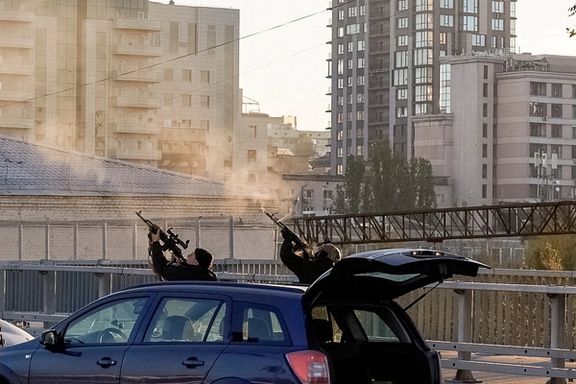
European Union governments have provisionally agreed to impose sanctions on eight people and entities over Iran’s supply of drones to Russian to be used against Ukraine.

European Union governments have provisionally agreed to impose sanctions on eight people and entities over Iran’s supply of drones to Russian to be used against Ukraine.
Three diplomats said that sanctions experts from the 27 EU members agreed to the list in a meeting on Wednesday. It will be further discussed by national ambassadors at a meeting scheduled for later in the day.
EU governments have until Thursday morning to decide whether to approve the sanctions, the goal being to agree the package before leaders convene in Brussels for a summit starting later in the day.
Ukraine has reported a spate of Russian attacks using Iranian-made Shahed-136 drones in recent weeks, while Tehran and Kremlin deny the supply of drones to Russia.
A European Commission spokesperson said there was consensus on foreign ministers meeting in Luxembourg October 17, that the EU should react swiftly. "Now that we have gathered our own sufficient evidence, work is ongoing in the Council with view to a clear, swift and firm response," the spokesperson told the EU's executive's daily news conference.
In addition to supplying drones, Iran has promised to send its own Fateh-110 and Zolfaghar surface-to-surface missiles to Russia for strikes on Ukrainian cities and troops. A deal was agreed on October 6 when Iran's First Vice President Mohammad Mokhber, two senior officials from Iran's Revolutionary Guards and an official from the Supreme National Security Council visited Moscow for talks with Russia about weapons deliveries.
Iranian Foreign Minister Hossein Amir-Abdollahian announced on Wednesday that four institutions and 15 foreign officials that had a hand in the sanctions against the Islamic Republic would be added to the country’s blocklist.
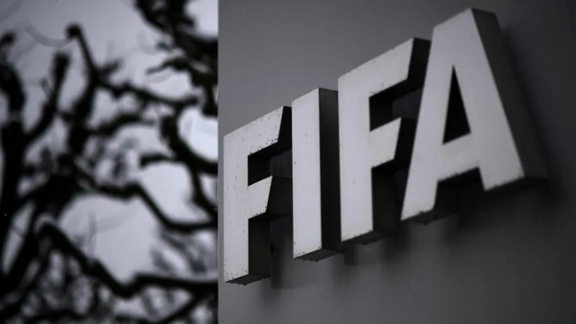
A British member of parliament says international football (soccer) governing body FIFA should stop Iran from participating in the World Cup for its supply of weaponry for the Russian invasion of Ukraine.
Labor MP Chris Bryant, the chair of the All-Party Parliamentary Group on Russia and former Foreign Office minister, told Telegraph Sport on Monday that any country founded to have “provided military support” for Russian President Vladimir Putin’s invasion should be banished from world sport.
He called on FIFA to make a move before Iran’s national football team’s opening match against England.
Referring to FIFA and UEFA’s decisions to throw Russia out of the international football events in the wake of Putin’s invasion of Ukraine, including from March’s World Cup play-offs and the entire 2024 European Championship, he said, “Sporting authorities around the world and in every sport should be looking very carefully at Iran’s direct engagement and support for Putin in his illegal invasion of Ukraine.”
“Dictatorial regimes relish sporting success. We should deny them that opportunity,” he noted.
Since March, many Iranians themselves have been urging FIFA to ban Team Melli from the World Cup for forcibly barring women from entering stadiums to watch matches. Under FIFA pressure, Iranian authorities started to let in a cherrypicked group for women so they would not face bans and penalties. However, since the start of the current uprising across Iran and a lackluster support from the national squad, the calls on FIFA to ban Iran have become stronger.
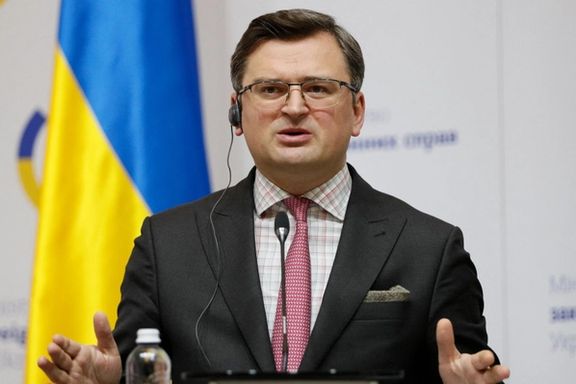
Foreign Minister Dmytro Kuleba said Tuesday he had called on President Volodymyr Zelenskyy to break off Ukraine’s diplomatic relations with Iran.
Kuleba said Kyiv was willing to share a “bag of evidence” with the European Union that Russia had used Iranian-made military drones in the current conflict. The EU is currently considering sanctions against Iran should the Ukrainian claims be proved.
Russia used dozens of ‘kamikaze’ drones in attacks Monday that Ukraine says were Shahed-136s, killing four people in Kyiv. “Tehran bears full responsibility for the destruction of relations with Ukraine”, Kuleba told a news conference.
While Iran has denied supplying drones to Russia, analysts point out they could be a cheap if less effective alternative to Russia’s diminishing stocks of missiles. The State Department’s Vedant Patel Monday backed up Ukraine’s claims, saying there was “extensive proof” Russia was using Iranian-made drones.
Iran has been a close military ally of Russia in the Syrian war, where Moscow supplies air power and Tehran tens of thousands of militia ground troops to defeat the opponents of Bashar al Assad's government.
Iran's Supreme Leader Ali Khamenei also backed Vladimir Putin in July by praising the Russian leader's "initiative in in invading Ukraine.
‘Pressure on Israel’
In his press conference, Kuleba also said Kyiv would send an official note to Israel seeking military aid including air defense supplies. Disappointed at Israel’s refusal to supply weapons, Ukrainian officials have sought to highlight Iran’s relationship with Russia.
Ukraine and Iran have maintained diplomatic relations despite disagreements and an exchange of sharp language over the January 2020 shooting down by Iranian air defenses of a Ukrainian passenger plane, killing all 176 aboard, during heighted US-Iran tensions.
In an analysis Tuesday, the New York Times argued that a Tehran-Moscow “alliance” was “raising the pressure on Israel, Iran’s sworn enemy, to take Ukraine’s side in the war.”
On Sunday Nachman Shai, Israel’s Minister for Diaspora Affairs, argued for sending military aid to Kyiv on top of existing humanitarian relief. But Tuesday, before Kuleba’s remarks, Justice Minister Gideon Saar, who sits on Israel’s decision-making security cabinet, told national broadcaster Army Radio that Israel’s support for Kyiv “does not include weapons systems and weaponry - and there is no change to that position.”
‘Reckless’ supply
Dmitri Medvedev, deputy head of Russia’s Security Council, warned Monday that “reckless” supply of Israeli hardware would “destroy all interstate relations between our countries.” Around 15 percent of voters in Israel, where there is a general election November 1, are Russian-speakers. Israel has also had intelligence coordination with Russia in Syria, where both air-forces have operated during the decade-long conflict.
Ukraine has been successful gaining military aid from the European Union, whose foreign ministers’ meeting in Luxemburg Kuleba addressed virtually Tuesday “from the bomb shelter.” The foreign minister tweeted that he had asked the Europeans for “more air defense and ammunition” and for “sanctions against Iran for supplying the Russian Federation with drones.” The EU announced Tuesday a further €500-million ($492 million) military supplies to Ukraine, bringing the total to €3.1 billion ($3.01 billion). United States support is around $17 billion so far.
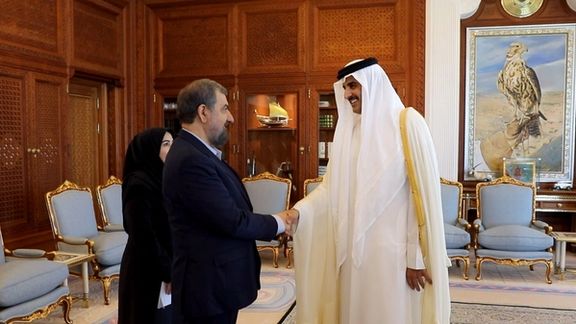
Argentina has called on Qatar to arrest visiting Iranian vice president Mohsen Rezaei over his alleged responsibility for the deadly 1994 bombing of a Buenos Aires Jewish center.
According to the official Telam news agency on Monday, special prosecutors have submitted a petition to Argentina's foreign ministry calling for all appropriate diplomatic levers to be pulled.
The ministry "requested the collaboration of Interpol for the arrest," while Foreign Minister Santiago Cafiero "instructed the Argentine ambassador in Doha... to communicate urgently with the Qatari Foreign Ministry and report on the situation," a diplomatic source said.
Ebrahim Raisi’s vice president for economic affairs, Revolutionary Guard’s commander Rezaei (Rezai) is wanted by Argentinian special prosecutors for alleged participation in the planning of the July 18, 1994 bombing of the Argentine Israelite Mutual Association, or AMIA, which killed 85 people and wounded 300.
In 2007, INTERPOL General Assembly upheld the unanimous decision made by the organization’s Executive Committee to publish six out of nine Red Notices requested in connection with the AMIA.
The notices were requested by the Argentinean National Central Bureau (NCB) for Imad Fayez Moughnieh, the number two in Iran-backed Hezbollah, Iran’s Former Intelligence Minister Ali Fallahian, Cleric Mohsen Rabbani – known as the chief architect of Iran's Latin American missionary network -- Iranian diplomat Ahmad Reza Asghari – aka Hamid-Reza Es’hagi and Moshen Ranjbaran -- and Revolutionary Guards commander and incumbent Interior Minister Ahmad Vahidi as well as Mohsen Rezaei.
Earlier in the year, Argentina condemned the presence of Rezaei in the inauguration of the new Nicaraguan president Daniel Ortega, describing it as an insult to the victims of the bombing of the Jewish center.
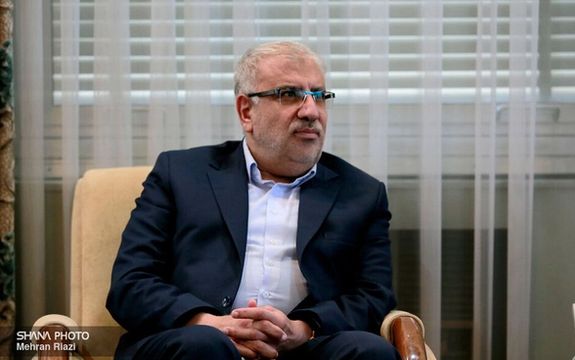
Iran’s Oil Minister Javad Owji says the Islamic Republic needs some $80 billion in domestic and foreign investment to avoid natural gas shortage in winters.
On Tuesday Owji once again warned that the country would face a 200-million cubic meter daily shortage of natural gas this winter.
Speaking at a parliament session he said this amount is needed “in upstream and downstream to resolve the issue within the next three to four years,” something which is impossible due to lack of foreign investment.
Iran needs to develop its oil and gas sectors by technology from Western energy giants to boost production which is gradually falling. For instance, as natural pressure in the South Pars gas fields is dropping Tehran needs billions of either partnership deals or cash investments to build larger platforms to extract more gas.
More than 70 percent of Iran’s energy is supplied by natural gas and the South Pars field is responsible to provide around 75 percent of this amount, reiterated the oil minister underlining that the lack of investment to develop gas fields is the main cause of this shortage.
It was interesting to observe that Iranian officials and government-controlled media were claiming in August and September that as winter approaches in Europe, the West will need Iran's energy and might make more concessions in the nuclear talks.
Not only the oil minister but a host of other officials and local experts constantly highlight the need for foreign investments, but they have no say in the country’s foreign policy, which is the exclusive domain of Supreme Leader Ali Khamenei.
Director of Tehran Chamber of Commerce Investment Services says foreign investors are reluctant to enter a country in which even domestic investors cannot work and capital outflow is on the rise.
Speaking to ILNA News Agency, Faryal Mostofi said on Tuesday that apart from Western sanctions, lack of security in investment and economic freedoms in Iran have also dissipated investors’ enthusiasm to release funds, stating that Iran could become a suitable place for foreign investors if conditions were right.
Summarizing the reasons for the crisis, Mostofi added that “inflation, sanctions, mismanagement, corruption, and strict regulations” have forced even Iranians to invest their capitals in housing sector in countries like Turkey and the United Arab Emirates.
According to her, something between $30 to $100 billion capital has left Iran in the past ten years due to inability of government to control inflation, while countries like Afghanistan and Iraq have been able to fix it below five percent.
Since the Islamic Republic was established in 1979 Iran’s rate of growth has been relatively low averaging less than 3 percent per year, this comes as experts say it needs around six percent annual growth to solve its endemic unemployment problem.
It is not just the nuclear dispute and its resulting sanctions that prevent the involvement of Western firms, it is also Iran’s overall foreign policy as an anti-West ‘revolutionary’ state, with an unpredictable behavior and a closed economy.
Iran has the second largest natural gas reserves in the world, holding more than 17 percent of global discovered gas fields. However, without foreign investment and technology, it will become a natural gas importer while the US sanctions would not allow Western companies to have any business dealings with the country.

The United States will crack down on Iranian drone transfers to Russia and third parties helping Iran in UAVs and missiles, the State Department said Monday.
The US also agrees with British and French assessments that Iran supplying drones to Russia would violate a UN Security Council resolution that endorsed the 2015 nuclear deal between Iran and six powers, State Department spokesman Vedant Patel said.
"Earlier today our French and British allies publicly offered the assessment that Iran’s supply of these UAVs (for) Russia is a violation of UN Security Council resolution 2231," Patel told reporters, referring to unmanned aerial vehicles (UAVs), or drones. "This is something that we agree with."
Ukraine has reported a spate of Russian attacks using Iranian-made Shahed-136 drones in recent weeks. Iran denies supplying the drones to Russia, while the Kremlin has not commented.
The State Department assessed that Iranian drones were used on Monday in a morning rush hour attack on the Ukrainian capital Kyiv, an official said. White House spokesperson Karinne Jean-Pierre also accused Tehran of lying when it says Iranian drones are not being used by Russia in Ukraine.
Resolution 2231 endorsed the deal between Iran and Britain, China, France, Germany, Russia and the United States that limited Tehran's uranium enrichment activity, making it harder for Iran to develop nuclear arms while lifting international sanctions.
Under the resolution, a conventional arms embargo on Iran was in place until October 2020. Despite US efforts under former president Donald Trump, who took the United States out of the deal in 2018, to extend the arms embargo, the Security Council rejected this, paving the way for Iran to resume arms exports.
However, Western diplomats said the resolution still includes restrictions on missiles and related technologies that last until October 2023 and that encompass the export and purchase of advanced military systems such as drones.
European are still not sure if they would impose sanctions on Iran for the drone transfers. Arriving in Luxemburg Monday for a meeting of EU foreign ministers, Josep Borrell, the EU foreign policy chief, said Europe would look for “concrete evidence” over reports that Russia had used Shahed-136 drones in recent weeks.
But the United States is certain Russia is using Iranian drones. "It is our belief that these UAVs that are transferred from Iran to Russia and used by Russia in Ukraine are among the weapons that would remain embargoed under 2231," Patel said.
The Washington Post Sunday also cited “an intelligence assessment shared in recent days with Ukrainian and US officials [that] contends Iran’s armaments industry is preparing a first shipment of [surface-to-surface] Fateh-110 and Zolfagher missiles…”
The Biden Administration and its European allies, France, Germany and the United Kingdom that unsuccessfully negotiated for nearly 18 months with Iran to revive an Obama-era nuclear deal, the JCPOA, seem to realize that ignoring Tehran’s actions will not help soften its stance in reaching a deal.
Recent popular protests have also cast a further shadow on the attitude of Western countries toward the clerical regime in Iran. Government security forces have killed nearly 250 people including many children since mid-September after the death of Mahsa Amini, a young woman, at the hands of the ‘hijab police’.